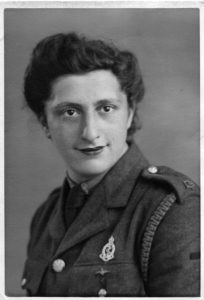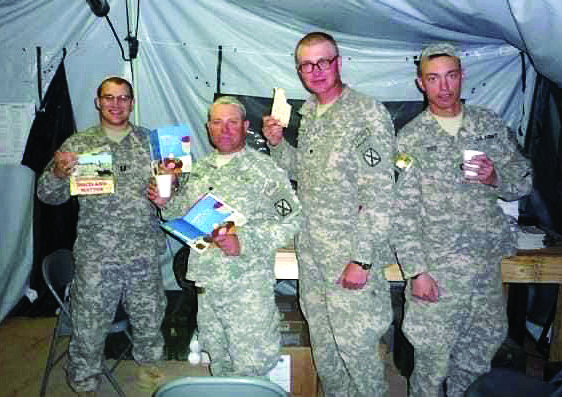By Larry Jasper, National Editor
Meet Hannah Deutch. She grew up in Post-World War I Germany. Her father fought in the German Army during the war.
In her younger days she belonged to the Reichsbund Judischer Frontsoldaten, or RJF, a veterans’ organization of German-Jewish soldiers, founded in 1919, to demonstrate Jewish loyalty to the former German Empire. This was a version of the American Jewish War Veterans. They had a large gym, cafeteria, room for men to play cards, and many other activities. Hannah joined when she was only 8 years old. There were no other facilities, such as restaurants and movies that were open to German Jews at the time.
Despite her father’s death from influenza when she was just seven, Hannah said life was good until Kristallnacht on November 9, 1938. That night, mobs, spurred on by Nazi Party officials, attacked Jewish owned stores, homes, and synagogues. Hannah said, “I woke up by my bed shaking and my room was filled with light.” The light came from the burning synagogue behind her home. The night of broken glass resulted in the burning of 267 synagogues and the destruction of 7,000 Jewish businesses. More than 30,000 Jewish men were arrested and sent to concentration camps. They were released within six weeks because the camps were not ready to hold them.
The handwriting was on the wall and the lucky ones were able to get out before the Nazi’s decided to start killing Jews in concentration camps.

Hannah Deutch
Hannah was among the lucky ones. She left for England as part of the Kindertransport on February 2, 1939. After Kristallnacht, the British government allowed children to leave the Reich and come to England as refugees. “Only my mother survived,” Hannah said. “All the rest of my family perished in the camps.” Hannah was 16 years old when she arrived in England, but she started training as a nurse, and served in the British Army from 1941 until 1944.
Hannah married a Canadian soldier and at the end of 1944 she emigrated to Canada as a war bride. She had her first son in 1945. He later served in the IDF and fought in the Six-Day War. After some time in Israel, he joined his mother in New York. During the Vietnam War, that son moved to Canada after learning his IDF service did not exempt him from the draft. Hannah’s second son, born in 1947, currently lives in New Hampshire.
Hannah’s husband died in 1949 from wounds he sustained on D-Day.
Hannah came to the United States in 1962 and joined both JWV and the National Museum of American Jewish Military History. She is still an active member of both organizations.
In 1963 she joined Hadassah and B’nai B’rith. B’nai B’rith had chapters in Germany, Czechoslovakia, and Austria. Her parents belonged to the chapter in Germany, and she joined that group when many of its members moved to the United States.
For 17 years Hannah visited the United Nations on Holocaust Remembrance Day, January 27, proudly wearing her JWV cap. During those visits, she took many of her fellow JWV members with her to the event.
Through a speaker’s bureau, Hannah continues to teach about the Holocaust to synagogues and other organizations, including many school children.
Through JWV, Hannah volunteered at St. Albans VA Medical Center in Queens, New York. For 12 years she helped provide Jewish services and a Kiddush to the patients each Wednesday.
Hannah served in many leadership roles during her time in JWV, including Post Commander of Post 209, Queens County Commander, Department Chaplain, and the Chair of the National Holocaust Committee. Hannah is currently a member of Post 1 in Manhattan.
On July 3, Hannah turns 100 years young. Be sure to wish her a very happy birthday!
Volume 76. Number 1. 2022


